The Journals of Ayn Rand Read online
Page 30
He has never allowed himself a complete, profound, personal desire of his own. But, at the climax of his life, an overwhelming personal issue forces him to put his power over men to an actual test. He attempts, for once, to sway the public opinion which he thought he controlled. He attempts to use his newspapers to champion an unpopular cause crucially important to him. He finds himself helpless. Public opinion will not follow him. Men are deaf to his commands and to his pleas—men who have never been given cause to respect him. He sees, for the first time, that he has no power over men, but has surrendered himself into their power instead, that he does not rule, but is ruled, that he has been a figure-head sitting on a throne which they had created and which he could occupy only so long as he pleased them, that he is the creation of his own slaves, that he is the puppet and they hold the strings, that his life and his power have been second-hand. And the monster he helped to feed is now unleashed against him: the voice of other men, the pressure of public opinion force him to betray his own cause, to reverse the policy of his papers in obedience to the general desire and against his first and only ideal.
Ellsworth M. Toohey, the fourth man, is a creature of perfection in his own kind, just as Roark is a creature of perfection in his—and the complete antithesis of Roark. Toohey is successful at the evil of which Keating and Wynand are victims. Toohey is the paragon of spiritual “second-handedness.”
Basically, Toohey is non-creative. He has nothing of his own to offer—to himself or to others. His evil lies in [the fact] that he knows it, accepts it and glories in it. He begins where Keating and Wynand ended. Keating sought superiority after his own fashion; he wished for good, even though his conception of good was false; when he discovered the basic lie of his life, when he saw that he had been neither superior nor good—the discovery brought him spiritual ruin. Wynand sought power as a means of independence; when he discovered the true nature of his power—he was ended spiritually. Toohey began by seeing and accepting what these two could not accept; he knew himself to be incapable of intrinsic superiority or independence; he made of this his virtue; he dedicated himself to the destruction of all superiority and all independence. He accepted consciously the negation of all values, of all ideals, of all that is high and noble in man—with a full realization of the meaning of such values. Not in frustrated longing for an ideal, but in cold and deliberate hatred of all integrity. He chose to be consciously evil. He is the great Nihilist of the spirit.
Toohey understands human greatness and the motive-power of human greatness better than any other man in the story. Roark is great, but too unself conscious to analyze or understand it—for a long time. Keating and Wynand seek greatness blindly. Toohey knows its roots. He understands fully the basic antithesis, the two principles fighting within human consciousness—the individual and the collective, the one and the many, the “I” and the “They.” He knows that the source of all greatness, of all that is free, creative, forward-moving, and—ultimately—benevolent to all men is a man’s basic independence of spirit, his integrity of thought untouched, fundamentally, by any concern for others. He knows that the source of all evil and all sorrow, of all frustration and all lies is the collective sense, the intrusion of others into the basic motives of a man. And since he is dedicated to the destruction of greatness, he becomes the enemy of the individual and the great champion of collectivism.
Toohey knows that each man must be judged by what he has achieved through the creative labor of his own mind, not by what he has or has not done for others; that his creation is the greatest gift he can bring to others, such as the creations of all great thinkers, artists, and scientists, creations made possible not because of their brothers, but in spite of the opposition of their brothers, made possible only by the profoundly selfish integrity of the spirit of the great creators. Toohey knows that a man’s achievement is the only measure of his value and of his superiority. And Toohey knows that in such a competition he has no chance at superiority; he is basically sterile; he has no great passion for anything and no great interest in anything save other men. Thus he decides not to attempt to seek superiority, but to do better: to destroy its very conception. He cannot rise. He can pull others down. He cannot reach the heights. He can raze them. Equality becomes his greatest passion.
His life program is simple: to destroy men by tying them to one another; to preach self-sacrifice, self-denial, self-abasement; to preach the spiritual slavery of each man to all other men; to fight the great creator and liberator—Man’s Ego. Toohey is famous as “The Humanitarian.”
Any form of personal happiness is a form of freedom. To destroy men he must destroy their joy in living; to destroy their joy in living he must destroy all that is personally dear and important to them. Such is his first instinct in relation to any human being he meets. He wrecks the life of his niece, Catherine, by destroying the only important thing of her existence—her love for Peter Keating. He destroys Keating by killing such self-respect as Keating did possess. He attempts to destroy Dominique Francon, the heroine of the story (more about her later), by encouraging her perverse desire to resist all desires. He has no personal concern for Keating, Catherine, or Dominique; it is only their inner selves which he wishes to annihilate. Men who are happy live for themselves; Toohey cannot allow men to live for themselves; unhappy men turn to others for consolation, attempt to fill the emptiness of their failure by existing for the sake of others; and this is the state to which Toohey wishes them reduced. “Let all live for all. Let all sacrifice and none profit. Let all suffer and none enjoy. Let progress stop. Let all stagnate. There is equality in stagnation.” Such is Toohey’s secret motto. And it is the more frightening since he truly seeks nothing for himself. He does not wish to subjugate men to his own will. He wishes to subjugate all to the will of all. Which means—to the will of none. Universal slavery—without even the dignity of a master. Slavery to slavery. A great circle and an utter equality. Such is Ellsworth M. Toohey.
His chief weapon is mockery. A great, all-embracing nihilistic ridicule. Allow nothing to remain sacred in a man’s soul. Earnestness towards any conception whatever, the mere conception of earnestness itself, is the base of reverence. Allow nothing to be important to a man’s spirit. Laugh it out of existence. Laughter, not as joy, but as destruction. Fight ideals, not by denial, but by internal corruption. Toohey is wiser than Wynand; Wynand tried to destroy integrity by crude force from without, which merely tore that integrity, intact, out of a man’s soul. Toohey is subtler and deadlier: he makes integrity rot slowly within that soul. He uses a man’s integrity against itself; he makes it become loyalty to principles basically destructive of all integrity. He destroys idealism in men, not by denying it, not by preaching the vanity of all ideals, but in precisely the opposite manner: by professing the great value and glory of idealism in men and then directing their idealism toward objects basically destructive of all ideals. Thus, he holds out unselfishness as the supreme goal of the spirit; thus he holds out brother-love as the sublime virtue. He does not deny the conception of superiority among men, but destroys it by glorifying the worthless as superior. Thus, fully recognizing the genius of Roark, he holds him up to ridicule; fully recognizing the mediocrity of Keating, he hails him as a great architect. An art critic by profession, Toohey manages to reach into every field of creative endeavor; and in every field he enshrines mediocrity—in order to destroy all shrines. Keating in architecture; Lois Cook in literature—a phony “modernist” who writes “words on words,” “words above meaning” and thus destroys both words and meaning; in painting—a creator of the pork-chop-fur-lined-tea-cup school; and so on. Do not fight human achievement in the open. Destroy it from within. Destroy by internal corruption. Destroy the rare, the difficult, the exceptional, the original by substituting standards of achievement open to the abilities of any and all. That, also, is Ellsworth M. Toohey. That he is a Communist in his political convictions is only incidental; he proclaims that he fights Rockefeller and Morgan; he really fights Shakespeare and Beethoven.
Thus the four men of the story are: Howard Roark, who is great and knows it; Peter Keating, who could not be great and does not know it; Gail Wynand, who could have been; and Ellsworth M. Toohey, who could never be and knows it.
A few words about Dominique Francon and about the general course of the story.
Dominique’s basic passion is a fierce love of independence. But it is an independence that turns upon itself—in protest against the world she sees around her. Capable of great desire, she makes it her aim to desire nothing. Actually a saint, in that her subconscious demand is perfection—from herself and from all others—she finds a vicious delight in lowering herself to whatever action she considers most contemptible; since she cannot find perfection, she prefers its opposite extreme to compromise. But such conscious self-degradation is only her manner of a quest for the sublime. Her redemption is in that she never accepts spiritually the vile depths to which she descends; she defies the depths by descending.
It is quite obviously inevitable that she should love Roark and that her love for him should be final, complete and immediate. It is a love too great to be endured in acceptance; she can bear it only by denying, by resisting it, by degrading it, by trying to destroy it. Like most women, and to a greater degree than most, she is a masochist and she wishes for the happiness of suffering at Roark’s hands. Sexually, Roark has a great deal of the sadist, and he finds pleasure in breaking her will and her defiance. Yet he loves her, and this love is the only passion for another human being in his whole life. And her love for him is essentially worship, it becomes her religion, it becomes her reconciliation with life, with humanity and with herself—but not until many years later.
Roark’s life is the simple, s
ingle-tracked pursuit of his only goat—architecture. It is the continuous struggle of his own truth against men. He experiences every hardship, every defeat, every agony that men can place in his way. But it leaves him untouched—within. His conflict is with the outside world, not with himself. He never achieves universal recognition—which he never sought. But he wins the freedom to work as he believes, he fights through to the chance of creating great buildings. His buildings—not his love nor his compliance—are his gift to the world. And by ignoring men, he gives them creations of great value. At the end of the story, we leave him at the height of his work and of his power. And in that work, he has found a height of happiness unknown to most men, he has made the world a better place by the fact of making such happiness possible, by the fact of making it exist within his own soul—and the realization of man’s capacity for ecstasy is the only reason for this world’s existence. Or so the author believes.
Keating achieves the kind of success he seeks, early and easily. He wins great popular acclaim. But the emptiness and the uncertainty within him allow him no happiness. He has never known peace with himself. Such joy as he finds in life is only a guilty, unhealthy, unsafe satisfaction. He has not the courage of his own desires—and he passes up the only chance at happiness he had, his sincere love for Catherine. His success goes as it came—through the whim of others. His popularity fades as that of all current fashions; undeserved from the first, his fame dwindles and dies; he is replaced by other popular heroes of the same type. And it is only when people begin to desert him that he begins to question his own soul, to realize dimly what it was that he missed, what it was that he had always envied, feared and resented in Roark. When he understands it, it is too late. We leave him, a man without hope, without future, without past, a man who had lived through others, had brought them nothing but sorrow and left them nothing but bad imitations of every bad building created before him.
Toohey proceeds successfully on his chosen course of destroying all those whose lives touch his. He fails only with three human beings: Roark, Dominique, and Wynand. Roark is the great, consuming hatred of his life, the symbol of all that he must destroy. He is helpless before Roark; he cannot touch Roark spiritually—and he knows it. So he marshals every social weapon he controls—to break Roark’s career. And Toohey holds a great power over society, carefully built up through the years. But he fails. He cannot prevent Roark’s ultimate triumph. In regard to Dominique, Toohey is one of the few who understand her real nature. He goads her on to self-destruction. He helps to bring about her marriage to Wynand—a marriage he hoped would destroy them both. He has a special interest in Wynand: he works slowly, through many years, to obtain editorial control of the Wynand papers, on which he is employed as a special columnist-commentator. He understands Wynand. He knows that Wynand’s bitter cynicism is only a mask for the kind of spirit Toohey dreads; he knows that Wynand is not basically corrupt. He hopes to achieve that corruption through Dominique, whom he considers to be the worst possible influence that Wynand could encounter. He fails in his calculations. At the end of the story, he loses that particular battle by losing his position with the Wynand papers. But another great newspaper signs him up at once. Toohey, like time, marches on.
Wynand’s retribution comes first in the person of Dominique, in that he falls desperately in love with her; desperately—because it is his first complete, sincere and personal emotion. When he marries her, he knows that she does not love him, but he does not know that she loves Roark, that the marriage is only her way of defying and degrading her love for Roark, the bitterest way she could find. She chooses Wynand as the most completely vicious man she knows. She is disappointed in this; she herself brings the first awakening of Wynand’s essential self. His love for her becomes the symbol of everything he has missed in life: an experience completely his own, to be guarded savagely against all other men, those other men whose public property he is.
But it is Roark who is life’s final revenge upon Wynand. When [they] meet, Wynand is 54, Roark is 37. Wynand does not suspect that Dominique had been Roark’s mistress, and his attitude toward Roark has no relation to Dominique. Instead of the usual hatred which men of Roark’s integrity had always aroused in him, Wynand’s reaction is a great, irresistible, unformu lated wave of recognition and admiration. He does not understand or analyze it for a long time. He knows only that he needs Roark in some odd, unaccountable manner. Slowly, through their strange relationship of unspoken understanding, Wynand begins to realize that Roark is the symbol of everything he has betrayed; Roark achieved what he had lacked the courage to achieve; Roark is his own self, as he might have been; Roark is his revenge against society, against that mob whom Roark defies and to whom Wynand has surrendered. And although Roark is an external reproach to him, although the mere fact of Roark’s existence brings him the first spiritual suffering he has ever allowed himself to experience—Roark becomes Wynand’s obsession. Wynand is actually in love with Roark. It is love in every sense but the physical; its base is not in homosexuality; Wynand has never had any tendency in that direction. It is more hero-worship than love, and more religion than hero-worship. Actually, it is Wynand’s tribute to his own unrealized greatness. This love has no relation to his love for Dominique; it is not faithlessness to Dominique; and yet, were he ever asked to choose between the two, Wynand would have chosen Roark. Wynand welcomes the torture of loving a man whom he should hate. He finds a dim, twisted sense of atonement in his love for his worst spiritual enemy. He is punishing himself for what he has done—by bowing before what he should have done. It is his first acceptance of an ideal—and his first suffering for its sake. Roark becomes the most precious thing in his life.
Roark’s attitude toward Wynand is a deep understanding; in a way—respect ; and the only pity he has ever felt for any human being. As to Dominique, she sees the situation, resents it and is frightened by it. To her, there is no other reality and no other concern but Roark. She is jealous of Wynand, of any feeling Roark might have in response to Wynand’s adoration of him. It is a triangle—in which the husband and wife are both in love with the same man.
It is when—through Toohey’s efforts—Roark becomes the center of a sensational scandal and faces a trial involving a possible sentence of life-imprisonment, that Wynand attempts to defend Roark through the influence of his newspapers. Roark is the object of great public indignation. Wynand wants to defend him, more passionately than he would want to defend his own life. But he cannot fight the monster of public opinion. He is forced to make his papers clamor for Roark’s conviction. He is forced to betray his first and only god.
It is Wynand’s final tragedy. He faces the full understanding of his own spiritual degradation and of that illusory power over men for the sake of which he had allowed his degradation. Roark is acquitted. In the circumstances surrounding the trial, Wynand learns the truth about the past of Roark and Dominique, and that they still love each other. He loses them both. He is forced to divorce Dominique. He has nothing left but his newspaper empire, which he now hates—with all its energy, spirit and prestige gone.
Dominique comes back to Roark—completely, finally and voluntarily, understanding through him the meaning of life as he has lived it, as she is prepared to live it for the first time.
This, very generally and very roughly, is the story.
December 13, 1943
[Shortly after The Fountainhead’s publication, Warner Brothers bought the movie rights. The following notes were made as AR began work on the screenplay. ]
General Theme: Man’s integrity.

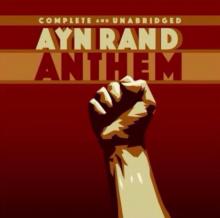 Anthem
Anthem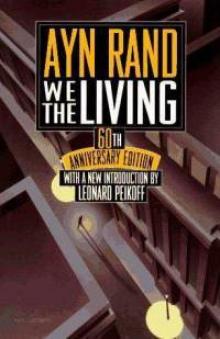 We the Living
We the Living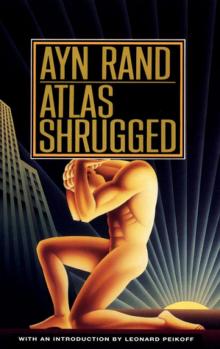 Atlas Shrugged
Atlas Shrugged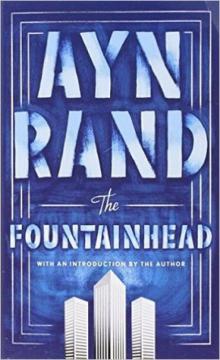 The Fountainhead
The Fountainhead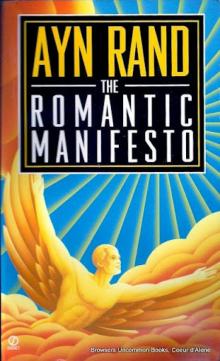 The Romantic Manifesto: A Philosophy of Literature
The Romantic Manifesto: A Philosophy of Literature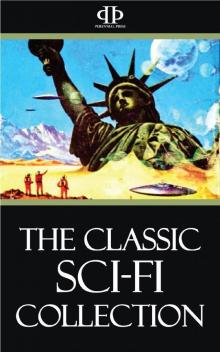 The Classic Sci-Fi Collection
The Classic Sci-Fi Collection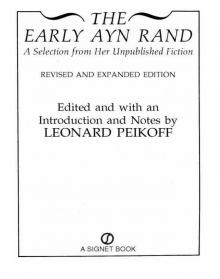 The Early Ayn Rand
The Early Ayn Rand